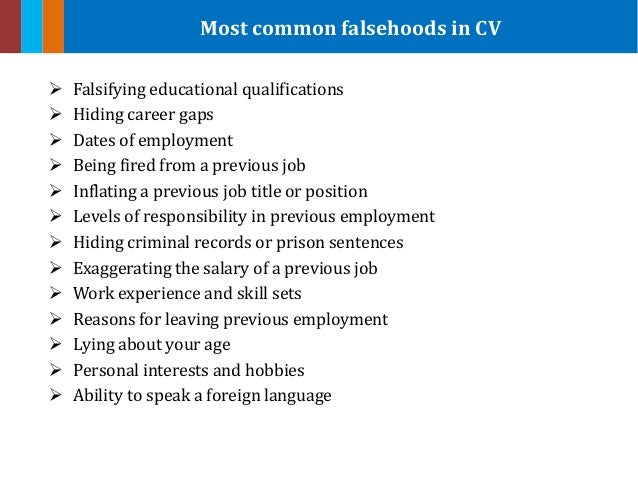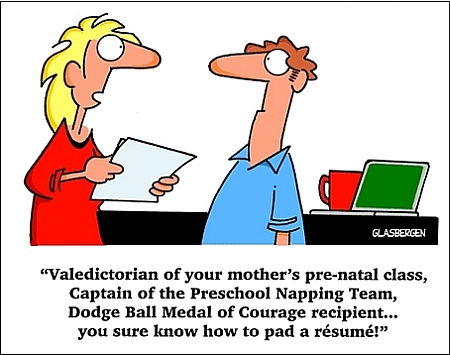The Dos and Don’ts of Padding a CV
 Recently, Brian Williams, NBC News’ anchor, has been forced to admit to a lie he’d been telling since 2003. The tall story was that during the Iraqi War he had a harrowing near-death experience aboard a military helicopter that was supposedly hit by an RPG. Unfortunately, he wasn’t quite the brave journalist ducking missiles he made himself out to be, but merely a spectator sat safely in a helicopter flying behind the one that had been attacked. Publicly shamed, Williams has been suspended without pay and his journalistic integrity has been called into question. And hot on the heels of that story, another broke out about yet another famous TV personality, FOX’s Bill O’Reilly. It’s quite similar in some aspects, though it had an unanticipated side effect of actually helping O’Reilly get more screen time. Notwithstanding, the two stories echo that of many of the bigwigs in the media and the corporate world, as it seems that it’s nigh on impossible to simply climb the career ladder without some embellishment of one’s past. So is lying about one’s achievements such a bad thing? Or are there, perhaps, some innocuous white lies and much less acceptable, boldfaced untruths? Read on to find out all about the dos and don’ts of résumé padding…
Recently, Brian Williams, NBC News’ anchor, has been forced to admit to a lie he’d been telling since 2003. The tall story was that during the Iraqi War he had a harrowing near-death experience aboard a military helicopter that was supposedly hit by an RPG. Unfortunately, he wasn’t quite the brave journalist ducking missiles he made himself out to be, but merely a spectator sat safely in a helicopter flying behind the one that had been attacked. Publicly shamed, Williams has been suspended without pay and his journalistic integrity has been called into question. And hot on the heels of that story, another broke out about yet another famous TV personality, FOX’s Bill O’Reilly. It’s quite similar in some aspects, though it had an unanticipated side effect of actually helping O’Reilly get more screen time. Notwithstanding, the two stories echo that of many of the bigwigs in the media and the corporate world, as it seems that it’s nigh on impossible to simply climb the career ladder without some embellishment of one’s past. So is lying about one’s achievements such a bad thing? Or are there, perhaps, some innocuous white lies and much less acceptable, boldfaced untruths? Read on to find out all about the dos and don’ts of résumé padding…

What is résumé padding?
Essentially, it’s lying on your résumé to seem better educated, more experienced or more suited to the role you are about to apply for. Some famous padders included Jay Alpert, a MENSA-member ex-police officer, James Frey, a noted author, and Scott Thompson, former CEO at Yahoo. What did they have in common? They gave false information about their past in order to promote their agenda or get a job but were too brash, or perhaps too public a figure to get away with it. And in the wake of these cases a rather disturbing trend has become obvious: people regularly lie to get a job.

In 2010, a survey found out that 69 percent of recruiters were lied to by their candidates. The Miami Herald reported that nearly half of all résumés presented inflated positions, degrees and achievements, whereas a whopping 30% contained completely false information about the candidates. Executive recruiter Chris Brown says, „We’re seeing that more and more people aren’t telling the full truth when they’re completing a job application… There are so few people who look into people’s backgrounds or conduct credit checks. Applicants know that and hope there won’t be a background check.”

That hope is not entirely baseless, but according to the 2014 Business Wire survey, half of recruiters reject 90 percent or more of the applicants when they find out they’ve been lied to, particularly about a candidate’s degree, and a large portion of recruiters — 63 percent — disregard a candidate if his online presence included defamatory, racist or religiously biased statements online. Of those that do online searches to check their applicant (and the majority still do not routinely do that), 80 percent check LinkedIn, 48 percent look at Facebook profile and 63 percent Google their candidate’s name. Meanwhile, only 14 percent of the respondents consider looking into their prospective employee’s credit history.

This all points to a huge recurrence of the problem, even though the truth will out in a matter of seconds. And yet we pad, because we feel we must. But what lies are the most common?
Kim Isaacs, CEO of resumepower.com, states that the most common fibbing by far has to do with education. This is also where both Scott Thompson and Jay Alpert had misrepresented the truth to get their respective jobs. In the former case, the candidate had claimed to have a bachelor’s in computer science and accounting, though a subsequent background check revealed he had a BSc in business administration and majored in accounting. In the latter case, the candidate had graduated from a so-called diploma mill institution, an online or mail-order college that basically allows to buy degrees. The institution itself — LaSalle University of Mandeville (not to confuse with the actual LaSalle University in Philadelphia) — was accused of fraud and closed in 1996.

The two prominent figures lost their credibility and had to resign. However, Thompson didn’t actually admit to any wrongdoing — and his track record of 25 years on various executive posts proves he had been the right man for the job all along, despite the media frenzy over a „wrong” bachelor’s degree. „(He is) 54 years old, has been CEO of PayPal, and before that held high positions at Inovant, a subsidiary of Visa, and Barclays Global Investors. He’s qualified to run Yahoo,” says in his defence Daily Beast’s Dan Lyons. Kim Isaacs seconds that sentiment, saying; „He got caught, so he’s the obvious target. But it’s quite likely that many of the people who will talk about him have a similar lie on their résumés.” Everyone lies, and there’s no way around it, but for the unlucky few who get caught there’s simply no going back.
So should Thompson have been ostracized and publicly lambasted for his embellishments? Should Brian Williams’ name have been dragged through the mud because of one misrepresentation? Perhaps not. However, the peer pressure itself was enough for the former to relinquish his post and eventually move away from the limelight, costing him his career. The latter is now suspended without pay and may never be fully trusted as a journalist. Sure, not everyone will reach such heights to fall quite so spectacularly, but before you try to sneak some of your own exaggerations past the recruiter and climb that greasy pole, make sure you know what NOT to do. Let’s briefly examine the „big four” of the lies put into résumés by aspiring professionals.
Masking Employment Dates
A sin of omission is one of the least deplorable in the eyes of modern recruiter. The economy being what it is, it’s hard to find anyone with continuous employment. And yet many employees „stretch” their employment dates to hide unemployment. That type of lie is much harder to detect and is often told by freelancers. According to Inc.com’s Suzanne Lucas, one of the most common embellishments is widening the periods on the job while narrowing the gaps between jobs to seem to have no periods of prolonged unemployment. Though not entirely dishonest, it may nevertheless raise some red flags for your potential employer, so be careful with dates.

Deliberately Vague Jargon
Another potential disqualifier may be the use of catch-all terms formerly popular in the corporate setting. Contemporary corporate jargon has done away with terms like „synergy„, „passion”, „pushing the envelope„. What’s valued most nowadays is being plain-spoken and down-to-earth, especially when describing one’s duties and responsibilities.

„Don’t say something like: “leveraged my initiative and collaboration training to develop, coordinate, and facilitate a successful initiative that produced measurable results,” says Metrus’ Group Psychologist Carl Persing, advising against verbosity. Sometimes baroque language may be accidental, but more often than not it’s an attempt to inflate someone’s importance. This wastes everyone’s time and may actually hurt someone’s chances of getting the job.
Inflated Job Titles and Accomplishments
 Suzanne Lucas also warns about inflating your title in a CV. It’s obvious that someone doesn’t just jump from an entry-level clerk position to an executive post in a few months, and if that’s the case, many recruiters will smell something fishy and dig deeper, often uncovering someone’s ruse by simply asking them the right question during an interview. However, it may not be someone’s clumsy attempt at circumventing proper candidate vetting process; many smaller companies seem to love appointing administrators and executives left and right, even if their employees are glorified PAs or secretaries. A janitor becomes an ‚executive maintenance officer’, while a bike messenger is referred to as a ‚communications’ specialist’. In Isaacs’ perspective, inflating titles from receptionist to administrative assistant still occurs all too frequently and denotes a larger trend of passing someone else’s work for one’s own. Candidates like to make concerted effort from a group seem like their own doing, but recruiters have wised up to that practice long ago, so think twice about calling yourself a manager if you weren’t one.
Suzanne Lucas also warns about inflating your title in a CV. It’s obvious that someone doesn’t just jump from an entry-level clerk position to an executive post in a few months, and if that’s the case, many recruiters will smell something fishy and dig deeper, often uncovering someone’s ruse by simply asking them the right question during an interview. However, it may not be someone’s clumsy attempt at circumventing proper candidate vetting process; many smaller companies seem to love appointing administrators and executives left and right, even if their employees are glorified PAs or secretaries. A janitor becomes an ‚executive maintenance officer’, while a bike messenger is referred to as a ‚communications’ specialist’. In Isaacs’ perspective, inflating titles from receptionist to administrative assistant still occurs all too frequently and denotes a larger trend of passing someone else’s work for one’s own. Candidates like to make concerted effort from a group seem like their own doing, but recruiters have wised up to that practice long ago, so think twice about calling yourself a manager if you weren’t one.
But even if you know all there is to know about actually doing a job and just exaggerate a little, there’s one inexcusable misstatement you can make that may haunt you years after being hired, as Thompson and Alpert can now attest.

Education Padding
Lying about your degree, university or course taken is THE cardinal sin of HR padding. In case of media personalities like Williams or O’Reilly, their credentials are the same as their experience, it’s what they’ve done after they got their jobs. But in the corporate world, having the right education and title is what separates the wheat from the chaff before an interview. Some firms won’t even consider undergraduates or dropouts because they simply don’t have the resources to train and educate their potential candidate. And in any case, lying about a degree is pointless: according to research, nearly a 100 percent of recruiters nowadays bother checking that part of the résumé, or at least verify the existence of the school (to avoid a diploma mill-graduate).
Persing says, „The ability to articulate how your education translates to knowledge, skills and abilities relevant for the job you are seeking will take you much further than misrepresenting yourself.” Instead of providing a phony degree, says Persing, you should state you’ve participated in a certain program, completed classes in some area and are now able to do certain things professionally. „You’ll convey the impression that you can apply your education to real-world situations, which employers appreciate,” he adds.
And if you’re worried about being a dropout, don’t: half of the Silicon Valley moguls have dropped out before getting a diploma. But just in case, provide an explanation for not finishing your course in the cover letter — even if it’s not read, you’ve not lied in your résumé, and honesty always pays.
The reasons for padding are numerous, but perhaps the practice itself may be a little easier to forgive, knowing why people resort to doing it. „[People] feel inadequate and have to do whatever it takes to get their foot in the door,” Kim Isaacs explains, adding, „It’s a combination of wanting to get an edge and jobs being limited due to the economy… People see others getting ahead and think, ‚maybe it’s my résumé.’ The temptation arises from a desire to stay competitive.”
So what lies did you put in your résumé? Or have never even been tempted to show yourself in a little dimmer, more flattering light towards your prospective employer?

VOCABULARY
anchor – prezenter TV
to force sb to do sth – zmusić kogoś do zrobienia czegoś
to admit to sth – przyznać się do czegoś
tall story – wymyślona opowiastka
harrowing – wstrząsający
near-death experience – tu: otarcie się o śmierć
aboard – na pokładzie
military – wojskowy
RPG (rocket-propelled grenade) – granat o napędzie rakietowym
to duck sth – zrobić unik przed czymś, uchylić się
missile – pocisk
spectator – widz
suspended without pay – czasowo zawieszony bez wypłaty
integrity – prawość, uczciwość
to call sth into question – podać coś w wątpliwość
hot on the heels of sth – tuż po czymś
to break out – pojawić się, zostać ujawnionym (o skandalu, wydarzeniu itp.)
personality – osobowość
unanticipated – nieoczekiwany
side effect – efekt uboczny
screen time – czas na antenie/w kadrze
notwithstanding – a jednak
to echo sth – powtarzać, być podobnym do czegoś
bigwig – gruba ryba
nigh on impossible – niemal niemożliwy
embellishment – przyozdobienie, upiększenie
achievement – osiągnięcie
innocuous – nieszkodliwy, niewinny
boldfaced – bezczelny
the dos and don’ts of X – coś co wolno, a czego nie należy robić w X
résumé – CV, résumé
padding – wypychanie (np. biustonoszu), tu: naginanie prawdy/upiększanie (CV w celu wydawania się lepszym kandydatem)
essentially – zasadniczo
suited – pasujący, odpowiedni
to apply for sth – składać o coś podanie, ubiegać się o coś
noted – uznany
former – były
CEO (Chief Executive Officer) – dyrektor naczelny
to have sth in common – mieć coś wspólnego
sb’s agenda – tu: czyjś interes, czyjeś dobro
brash – arogancki
to get away with sth – ujść na sucho (o czymś)
in the wake of sth – po czymś, wskutek czegoś
survey – ankieta, sondaż
inflated – sztucznie zawyżony, nadmuchany
degree – tytuł, stopień
whereas – podczas gdy, tymczasem
whopping – gigantyczny
to contain – zawierać
to look into sth – zbadać coś, prześledzić
sb’s background – czyjeś pochodzenie/przeszłość
to conduct sth – przeprowadzać coś
credit check – zbadanie zdolności kredytowej/historii kredytowej
entirely – zupełnie
baseless – bezzasadny
according to – zgodnie z, według
to reject – odrzucać
portion – część
to disregard sb – zlekceważyć kogoś, nie brać kogoś pod uwagę
defamatory – oszczerczy
X biased – o podłożu X
statement – tu: wypowiedź
majority – większość
routinely – zwyczajowo
respondent – ankietowany
to consider doing sth – rozważać zrobienie czegoś
prospective – potencjalny, przyszły
recurrence – ponowne wystąpienie, popularność
in a matter of X – w ciągu (zaledwie) X
fibbing – kłamstewko, historyjka
to have to do with sth – mieć coś wspólnego z czymś, dotyczyć czegoś
to misrepresent sth – przeinaczyć, wypaczyć coś
respective – odpowiedni
to claim – twierdzić
bachelor’s (degree) – stopień licencjata
computer science – informatyka
accounting – księgowość
subsequent – następny, późniejszy
to reveal – ujawnić
to major in X – studiować na specjalizacji X
latter – drugi, ten dalszy
to graduate from X – ukończyć naukę/studia na X
so-called – tak zwany
diploma mill – fabryka magistrów
mail-order – korespondencyjny
to confuse sth with sth – pomylić coś z czymś
actual – faktyczny
to accuse sb of sth – oskarżyć/obwinić kogoś o coś
fraud – oszustwo
prominent – znany, głośny
credibility – wiarygodność
to resign – ustąpić ze stanowiska
wrongdoing – popełnienie przestępstwa/wykroczenia
track record – historia osiągnięć/dokonań
various – rozmaity
post – pozycja, stanowisko
all along – od początku, cały czas
despite – pomimo
frenzy – gorączka, nagonka (wokół czegoś/na kogoś)
subsidiary – podmiot zależny, filia
qualified – mający kwalifikacje, wykwalifikowany
in sb’s defence – na czyjąś obronę
to second sth – wtórować czemuś, potwierdzać
sentiment – odczucie, przekonanie
there’s no way around it – nie da się tego uniknąć
there’s no going back – nie da się wrócić (do czegoś/poprzedniego stanu)
to ostracize sb – zbojkotować kogoś
to lambaste – ostro skrytykować
to drag sb through the mud – obrzucić kogoś błotem
peer pressure – presja ze strony rówieśników/branży
to relinquish sth – zrezygnować z czegoś
the limelight – światło jupiterów, centrum uwagi
height – wysokość, szczyt
exaggeration – wyolbrzymienie
to sneak sth past sb – przemycić coś pod czyimś nosem
to climb the greasy pole – piąć się mozolnie po szczeblach kariery
to make sure – upewnić się
briefly – krótko, pokrótce
to examine – przeanalizować
aspiring – ambitny, początkujący
employment – zatrudnieni
sin of omission – grzech niedomówienia
deplorable – naganny
modern – współczesny
to stretch – naciągać, rozciągać
unemployment – bezrobocie, tu: bycie bez pracy
to detect – wykryć
freelancer – wolny strzelec
gap – przerwa, luka
prolonged – długi, przedłużający się
dishonest – nieuczciwy
nevertheless – mimo to, a jednak
to raise red flags – zapalić światełko ostrzegawcze, wydać się podejrzanym
deliberately – umyślnie, z rozmysłem
vague – niejasny, ogólnikowy
disqualifier – czynnik dyskwalifikujący
catch-all term – słowo wytrych, ogólnik
setting – środowisko
contemporary – współczesny
to do away with sth – pozbyć się czegoś
synergy – synergia
to push the envelope – działać nieszablonowo, wykraczać poza sztywne/ciasne ramki
to value – doceniać
plain-spoken – mówiący otwarcie, prosto
down-to-earth – pragmatyczny, przyziemny
duties – zadania
responsibilities – obowiązki
to leverage sth – tu: wykorzystać coś (w celu osiągnięcia czegoś)
to facilitate – ułatwić, usprawnić
measurable – widoczny, wymierny
to advise against sth – odradzić coś
verbosity – wylewność, wielomówność
baroque – barokowy, przesadnie ozdobny
accidental – przypadkowy
attempt – próba
to waste sb’s time – marnować czyjś czas
job title – opis stanowiska pracy
accomplishment – osiągnięcie, zdobycz
entry-level – bazowy, najniższy
clerk – recepcjonista (US)
to smell sth fishy – dostrzec coś podejrzanego
to dig deeper – kopnąć głębiej
to uncover sth – odkryć coś
ruse – podstęp
clumsy – nieudolny
to circumvent sth – ominąć coś, wyminąć
vetting – badanie czyjejś przeszłości, prześwietlanie kogoś
to appoint sb – wyznaczyć kogoś, mianować
glorified X – zwykły, nic więcej jak X
PA (personal assistant) – sekretarz osobisty
janitor – woźny (US)
maintenance – konserwacja (US)
bike messenger – kurier rowerowy
to refer to sb as X – określać kogoś mianem X
to denote sth – świadczyć o czymś
to pass sth for sth – próbować przemycić/podać coś jako coś (inne, niż jest)
concerted effort – wspólny wysiłek
to wise up to sth – zorientować się w czymś
inexcusable – niewybaczalny
misstatement – wypaczenie (prawdy)
to haunt sb – prześladować kogoś, wlec się za kimś
to attest – przyznać
cardinal sin – grzech główny
credentials – kwalifikacje
to separate the wheat from the chaff – oddzielić ziarno od plew
to consider sb – rozważyć kogoś/czyjąś kandydaturę
undergraduate – student na studiach licencjackich
dropout – ktoś, kto nie ukończył studiów
pointless – bezcelowy
research – badanie, badania
to bother doing sth – zadawać sobie trud (z)robienia czegoś
to verify sth – sprawdzić coś, potwierdzić
existence – istnienie
to articulate – wysłowić (się)
to translate to sth – przekładać się na coś
relevant for/to sth – mający związek z czymś, mający znaczenie
to participate in sth – brać w czymś udział
the Silicon Valley – Dolina Krzemowa
mogul – potentat
to provide – zapewnić, dać
cover letter – list motywacyjny
to pay – opłacać się, popłacać
numerous – liczny
to resort to sth – uciekać się do czegoś
to get an edge – zdobyć przewagę
due to – z powodu, przez
temptation – pokusa
desire – potrzeba, pragnienie
competitive – konkurencyjny
flattering light – korzystne światło (sytuacja, w której ktoś wygląda dobrze/lepiej niż w rzeczywistości)
by Prochor Aniszczuk







